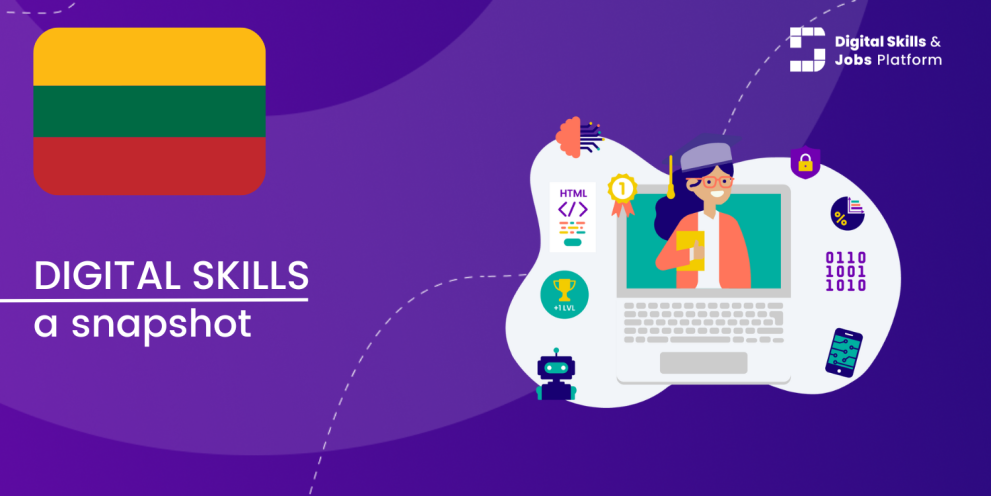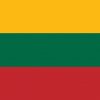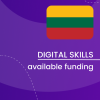Lithuania: a snapshot of digital skills

Introduction
In line with the Digital Decade Policy Programme 2030, DESI is now integrated into the State of the Digital Decade report and used to monitor progress towards the digital targets. According to the 2024 edition of Digital Decade report Lithuania’s performance in digital skills has room for improvement it has made an important progress in some indicators over the recent years, in particular in the area of ICT specialists. Still, Lithuania will need to continue the sustained efforts in view of the Digital Decade digital skills’ 2030 targets.
Almost half of the Lithuanian population masters at least basic digital skills, slightly below the EU average (52.9% vs 54%). The data on above basic digital skills show a similar difference, where Lithuania scores 23% against the EU average of 26%. The share of ICT specialists in total employment is 4.4%, below the EU average of 4.6% but significantly higher than last year (3.8%) and thereby converging quickly with the EU average. ICT graduates currently account for 4.7% of all graduates in Lithuania. Notably, the country remains significantly above the EU average in terms of gender balance among in the ICT workforce. Lithuanian enterprises are modestly investing in ICT training: only 13% provided specialised ICT training to their employees, against the EU average of 22%.
In IMD World Competitiveness Yearbook 2022 Lithuania is 2nd (among 63 countries) in Digital/Technological skills (2 points above the average), with 10th rank in Use of digital tools and technologies (7.55 vs average 6.29) showing that companies are very good at using digital tools to improve performance. Report also states that Digital transformation in companies is generally well implemented (6.79 vs average 5.95) and funding for technological development readily available (rank 25th).
National Digital Coalition in Lithuania was organized in 2013 with a mission to reduce the shortage of ICT specialists, improve the conditions for employees of the private and public sectors and the entire population to acquire and constantly improve the ICT and general skills necessary for work, to create an IT business and develop the digital market to entice more young people to choose ICT and other exact sciences studies and careers; to ensure the acquisition of the digital and universal skills necessary for work by studying other exact sciences; and to ensure the acquisition of digital and universal skills necessary for work by studying other exact sciences. Six associations and the Ministries of Education and Science, Communications, Social Security, and Labour, Vilnius University and Kaunas University of Technology are the founding members of the National Digital Coalition with the association "Langas ateiti" serving as coordinator of the initiative group.
Overview of state strategies and national initiatives
State strategies
The "Lithuania 2030" Progress Strategy is an omnibus document that enables the management of strategic objectives and the optimisation of a number of other strategic planning documents. The objective of the strategy is to foster progress-oriented values in the economy, government, and society. These developments will consolidate progressive values and advance sustainable development principles. In the smart society domain, the development, application, and recognition of individual talents are essential changes.
OECD Skills Strategy Lithuania was prepared in 2020 collaboratively with Lithuanian Ministries to develop policy responses that are tailored to the country’s specific skills needs. It identifies opportunities and makes recommendations for Lithuania to better equip young people with skills for work and life, increase adults' and enterprises' participation in learning, make better use of people's skills at work, and strengthen the governance of skills policies.
Lithuanian Industry Digitisation Roadmap 2020-2030 proposes key medium-term measures to be implemented by 2027 and long-term measures to be implemented by 2030, with an emphasis on implementing lessons learned and corrective actions from 2021 to 2027. Targeting technologies that will have the biggest impact on the digitisation of Lithuanian industry up to 2030, such as additive manufacturing, automation, robotics, mechatronics, smart sensors, photonics, internet of things, cyber security, cloud manufacturing, automated warehouse management systems, artificial intelligence augmented reality, business management systems.
National initiatives
Lithuania’s Recovery and Resilience Plan dedicate a 31.5% of total budget for the digital transformation. Its primary objectives for the next 12 months will form the foundation for innovative technological solutions in business and daily life, the efficacy of public services, the transformation of public information technology governance, and the steps towards 5G.
The Plan allocates 32% of its resources to digital transformation, including 117 million euros for Lithuanian language technology. The latter intends to facilitate universal access to digital resources and permit academia and industry to develop bespoke technologies. A €35 million project, for instance, seeks to develop language resources to improve national language AI systems and to aid in the preservation of the Lithuanian language. The plan supports the establishment of a State Cloud Services Infrastructure (€95 million) and has the widespread deployment of 5G as one of its primary focuses (€73.5 million).
Digital Education Transformation “EdTech” purpose is to promote the adoption of digital educational innovations in schools and enhance the digital skills of educators. The initiative encompasses the development of digital teaching tools, the digitization of instructional content, and the acquisition of equipment for distance and hybrid learning. A network of educator innovators and a testing environment for digital educational innovations will be established. By providing opportunities for pedagogues to obtain a master's degree in IT, digital pedagogical competencies will be enhanced. The initiative, led by the National Education Agency in collaboration with institutions of higher education, began in 2022 and will conclude in 2024.
Millennium School Progress Programme aims to reorganize and improve school infrastructure and guarantee equal access to education for all children in Lithuania, regardless of where they reside or their socioeconomic status. The programme provides support for school activities, teacher training, and infrastructure development, while establishing requirements for municipalities seeking support. The programme will receive 210 million euros from the Recovery and Resilience Facility. It was launched in January 2022. A significant proportion of municipalities have already designated schools to participate in the programme. Advisory services are provided so that high-quality investment plans can be formulated. By the end of June 2026, at least 80% of Lithuanian municipalities will have implemented the Millennium School programme, and 150 schools will be supported.
Senior Citizens Online Days Lithuania is yearly campaign organized by the association Langas ateiti from 2018. It invites seniors to be interested in the innovations of electronic services, learn to critically evaluate information, and improve their digital skills.
Funding opportunities
Funding opportunities for upskilling and reskilling to support the digital competences of individuals and organizations are available in form of loans, grants and financial instruments. For the period 2021 – 2026, most of the activities in digital transformation are financed through Recovery and Resilience facility but also as activities in Horizon, Erasmus+, ESIF and EEA grant schemes. You may find more on the page of the Lithuanian National Digital Skills and Jobs Coalition and in the article on the Digital Skills and Jobs Platform.
KURSUOK is a national one-stop-shop adult education platform where people can choose the training they need and which is relevant to their national priorities, and receive up to €500 in total funding. KURSUOK aims to encourage adults to develop their general and professional competences, to contribute to the promotion of a culture of lifelong learning in society, and to enable people who want to learn to apply for public funding.
The KURSUOK platform offers a wide range of training providers - from arts to technology training programmes. The key priority area of strengthening digital competences receives 50% of the €5.4 million total budget for this year.
More than 4,000 people have already completed training on the national adult education platform, which was launched at the beginning 2024, and almost as many adults have registered for various training courses funded by the state according to identified priority areas.
The funding for the learning programmes comes from the Recovery and Resilience Facility and the State Budget of the Republic of Lithuania. The funding and administration of the Learning Programmes is the responsibility of the European Social Fund Agency (ESFA). In 2024, the total budget for learning programmes funding is €5.4 million. Up to €12 million is planned to be made available by spring 2026.





